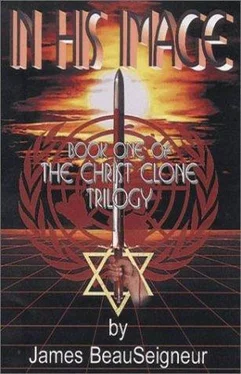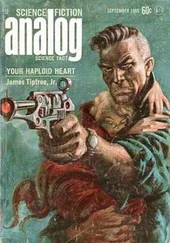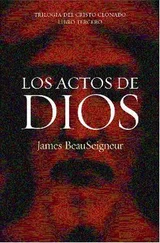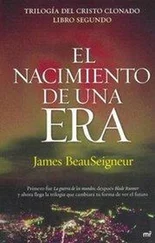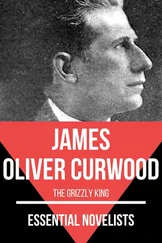"Hello, Rabbi," the man said, cordially, as he extended his hand. He was not at all what Cohen expected. He didn't appear to be a day over sixty. Most disconcerting of all was the way he was dressed – in a modern, dark gray business suit with a red tie. Somehow, as silly as it seemed, Cohen expected that the man would be wearing sandals and a long robe, tied at the waist with a rope. Yet, despite his appearance and the impossibility of his claim, there was something about the man that made Cohen believe he was exactly who he said he was.
"I'm the one you've been waiting for," the man said, still extending his hand. "But believe me, I've been waiting for you for a lot longer than you've been waiting for me." Cohen was silent, still unsure of what to say. "And you are Saul Cohen," the man continued, "of the lineage of Jonadab, son of Recab about whom Jeremiah prophesied."
Cohen's mouth dropped open. "That secret has not passed outside of my family for nearly twelve hundred years," he said.
"It is the only explanation for why you were not taken in the… um, 'Disaster'," the man explained. "And when you have completed your work, your son will take your place in the Lord's service, as was promised through Jeremiah."
Cohen grew pensive.
"Why don't we just sit down," the man suggested. "We have a lot to talk about." Cohen complied silently. "As our meeting indicates, the time is at hand for the end of this age." Without pausing to allow Cohen to consider the full impact of this statement, the man continued. "I've observed you for a number of years and I am now certain that you are the other witness. The fact that you recognize me confirms that belief."
"You were not sure before?" Cohen asked.
"I was not told who the other would be. I now see that I was led to you, but confirmation was left to the discernment and wisdom God has granted me. I had no special revelation on the matter."
This discovery caught Cohen off guard. "But… I don't understand. How could you not know?"
"Well, as the Apostle Paul wrote, 'For now we see through a glass, darkly; but then face to face: now I know in part; but then shall I know even as also I am known. ' I can assure you that as long as you and I remain on this side of life, that will never change – not even if you were to live to be two thousand years old."
"Rabbi," Cohen said, not knowing how else to address this man whom he considered to be hundreds of times his spiritual senior.
"Please," the man interrupted, "call me John."
This had gone on long enough. Cohen had to be sure he understood what was happening. "You are John?"
The man nodded.
"Yochanan bar Zebadee." Cohen said, using the Hebrew form of the man's name.
"I am," he answered.
"The Apostle of the Lord? You were there, at the foot of the cross?"
"I was there," he answered with an expression that showed he still felt the pain of that event nearly two thousand years earlier.
"But how? Have you returned from the dead?"
The man smiled. "In many ways I would have preferred that. But, no, I've been here, alive on this decaying world, waiting for this moment for almost 2000 years."
Cohen didn't repeat his question but his eyes still asked 'how?'
"Do you not recall what our Lord told Peter about me on the shore of the Sea of Tiberias?"
Cohen knew the words but he had never thought their meaning to be literal. After his resurrection, Jesus told the Apostle Peter how he (Peter) would die. Peter then asked what would happen to John. "If I want him to remain alive until I return, what is that to you?" Jesus replied.
"But you also wrote that what Jesus said didn't mean you'd never die, just that you might not die until after his return. " As soon as the words left his mouth, Cohen realized that he did not need an answer; both he and John were fully aware of the fate that soon awaited them – and that fate matched Jesus' words perfectly.
"The Lord told my brother James and me that, like him, we would both die a martyr's death. James was the first of the Lord's apostles to die,… and I shall be the last. I suppose in this way at least, my mother's request to Jesus will be granted: James and I will sit at the Lord's right and left hands in his kingdom."
Cohen still struggled.
"In the Book of Revelation," the man continued, "I said that an angel gave me a scroll and I was told to eat it. I wrote:
I took the little scroll from the angel's hand and ate it. It tasted sweet as honey in my mouth, but when I had eaten it, my stomach turned sour. Then I was told, "You must prophesy again about many peoples, nations, languages, and kings."
Cohen nodded recognition. "The words of the scroll were sweet," the man explained, "because in that moment I came to know that I would live longer than even Methuselah. But the scroll became sour in my stomach as I came to understand that I would have to wait longer than any other man to see the Lord again. Then I was told the reason that my life must continue: I have remained on this earth to prophesy again, this time with you, about many peoples, nations, languages, and kings."
Knitting his brow, Cohen lapsed into an introspective state. He believed but, then again, it was almost too much to believe. "I suppose it should have been expected," he said finally, "after you survived being immersed in boiling oil. And it explains the prophesies of Yeshua concerning the end of the age, when he told the disciples '… some who are standing here will not taste death before they see the kingdom of God come with power.' If you are John, then indeed that generation has not passed away. Still, what of Polycarp?" Cohen asked, referring to the late first and early second-century bishop of Smyrna who, according to his student Irenaeus, said John died during the reign of the Roman emperor Trajan.
"Have you not read Harnack?" the man responded, referring to the German theologian who propounded that Polycarp was referring not to John the Apostle but to another man, a church elder, also named John.
It occurred to Cohen that this might also explain one of the mysteries of the Bible that had always puzzled him. "And is this the reason for the apparent later additions to the original text of your gospel?" he asked for confirmation.
The man nodded. "I regret the confusion that has caused. From time to time I'd tell someone about something Jesus did or said that I had left out of my Gospel and they'd urge me to include it. It never even occurred to me that, by adding a few things I had left out of the earlier versions, I would cause so much confusion later on. Saul, I understand your reason for questioning, and yet I know that at the same time, the Spirit gives witness to you that I am who I claim to be."
"But where have you been?" Cohen asked. "How could you have kept your identity concealed?"
"It's easier than you might imagine," John answered. "I must admit, however, I've not always been as successful as I would like. There was a period of a few hundred years that no matter where I went – from China, to India, to Ethiopia – the stories would follow me."
A thought occurred to Cohen. "Prester John?" he asked, referring to the mysterious figure mentioned in dozens of legends and by a few more reliable sources such as Marco Polo, over a span of several hundred years and in widespread locations.
John nodded. "Though how I ever got tied in with the legends of King Arthur, I can only guess was the result of speculation that I had the Holy Grail.
"Since then, I've been a lot more careful about concealing my identity. To avoid questions I've had to move frequently – never more than ten or fifteen years in one place. And I have always tried to find work in the Lord's service that would not draw attention. I've pastored a hundred small churches in every corner of the world. But is it so surprising that I could have gone unnoticed in a world of hundreds of millions? After all, God himself became a man and lived on the earth and went unnoticed by the world for thirty years until the time was right for him to begin his ministry. Now the time is right for me; and for you as well, my friend."
Читать дальше
